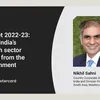Why startups are excited about FM's focus on mental health in Budget 2022
Finance Minister Nirmala Sitharaman’s rare mention of mental health in the Budget 2022 speech has got many startups buzzing. Less stigmatisation and more traffic is the expectation. But firms need to work on differentiated business models to keep customers and attract investments.
In Finance Minister Nirmala Sitharaman’s shortest Budget speech ever, the minister made space for the announcement of the launch of the National Tele Mental Health programme, validating an entire health spectrum that has for long been overlooked.
According to the minister, 23 tele-mental health centres will be launched, with the National Institute of Mental Health and Neuro Sciences (NIMHANS), Bengaluru serving as the nodal centre.
The announcement came as a ray of hope for many startups operating in this space struggling to attract users even though the coronavirus pandemic has accentuated mental health problems in people of all age. Reportedly, India reportedly has the highest rate of suicide in the world.
Shipra Dawar, Founder of IWill, a digital platform that connects patients with therapists, could not help but reminisce about the time she was thinking about becoming an entrepreneur.

Shipra Dawar (right) started ePsyClinic in 2015
“When I was going to start a business in the mental health space after leaving Boston Consulting Group (BCG), everyone thought I had lost it,” says the 34-year-old founder, who has been in the space since 2015.
“This acknowledgement by the government not only validates the sector, but I am hoping it will also push people to seek help,” she adds.
That said, Shipra affirms she has been noticing growth in her user base since the beginning of the pandemic. Backed by the incubator Venture Catalyst, IWill primarily connects users with therapists, among other services. The platform started seeing more enquiries from corporates looking to provide mental health sessions to their employees.
“Before March 2020, I did not focus much on corporates re. Today, we work with more than 50 companies,” says Shipra.
It’s the same story with other mental health startups including , an AI-based chatbot app that is also catering to corporates in the US, and . The women’s health platform, which also focuses on mental health issues, works with over 40 corporates including Nestle, and Stanza Living.
As pandemic-led lockdowns and other stresses added to work and family responsibilities, loved ones suffered illnesses and loneliness sent many into a downward spiral. This underlined the need for access to mental health professionals.
According to Dr Pankaj Jethwani, Executive Vice President at W Health Ventures, a Boston-based venture capital firm that invests in tech-enabled early-stage healthcare companies that are disrupting care delivery in the US and India, one in 10 Indians suffer from mental health disorders.
“The loneliness and anxiety associated with the pandemic has sensitised the population to acknowledge the gravity of the problem, even though mental health has been a taboo in Indian society,” Dr Pankaj said in an email interaction with YourStory.
But awareness is not the only problem in the list of challenges for mental health startups. While the Budget address is expected to increase awareness, the problem is on the supply and demand side as well.
“Even when there is awareness and desire to find a therapist, the starting point for the search is still usually friends and family. There is not yet a scale, organised player with high-quality, curated supply that is the go-to brand for this. The supply gap remains significant,” says Tejasvi Ravi, Principal and Healthcare Lead, Lightrock India (earlier known as Aspada).
It is not just Tejasvi who feels this way. About half a dozen experts YourStory spoke with have the same opinion. India’s current availability is one psychiatrist per three lakh population, according to Dr Pankaj.
Lack of awareness adds to this problem, which leads to startups not being able to build a sustainable business model.
“Even if people are aware of it, there is a different mentality in our country when it comes to healthcare. If we go to a doctor, we expect a quick solution. But that is not how it works with the brain. Things might not get solved in one visit or two. It could take months sometimes. This is what requires some more awareness as the early stigma around mental health starts clearing out,” says Anubhav Goyal, Associate at Chiratae Ventures, which invested in Mukesh Bansal-led Cure.Fit (now acquired by Tata Digital), which has a mental health division called Mind.Fit.

Finance Minister Nirmala Seetharaman holding budget speech in digital format
Hence, most startups have historically either turned to a marketplace model or artificial intelligence-based chatbot technology — both of which are difficult to scale.
The marketplace model has the supply-demand problem, and the chatbot market is extremely crowded, with many apps also available for free. Hence, nudging users to pay also becomes a challenge as people can always switch to another app offering the same services for free.
Many of these models are also replications of what has worked in the US, which essentially does not work in the Indian market. To be sure, this is not a new phenomenon. Most startup models including ecommerce, social network platforms, and food delivery aggregators were also taken from developed markets. The reason why they have worked in India is that it was customised to the flavour of the land.
The same could be done with mental-health startups. Firms that are focusing on product variations, solving one problem at a time, adapting natural language processing while collecting data, and building a trusted brand could find more takers in the investment ecosystem.
“It is a category formation happening in this space,” opines Lightrock’s Tejasvi.
Edited by Anju Narayanan









